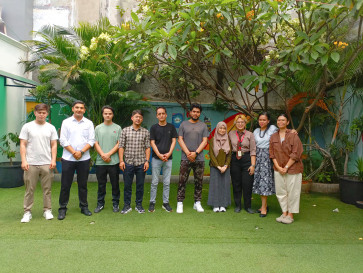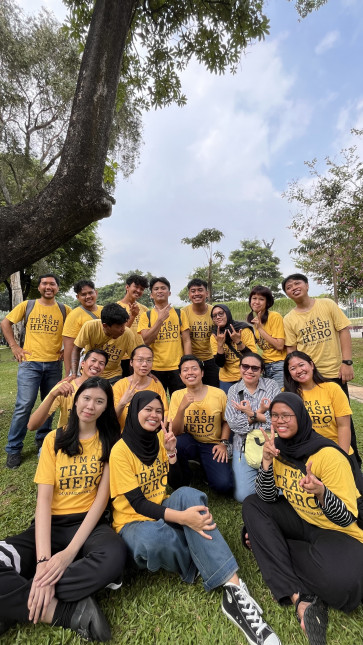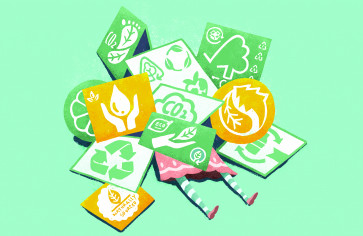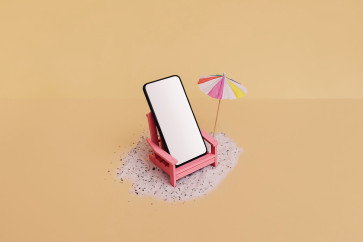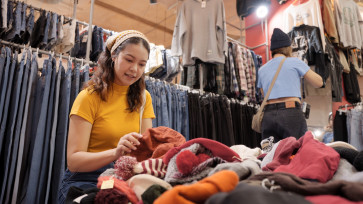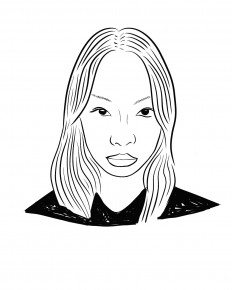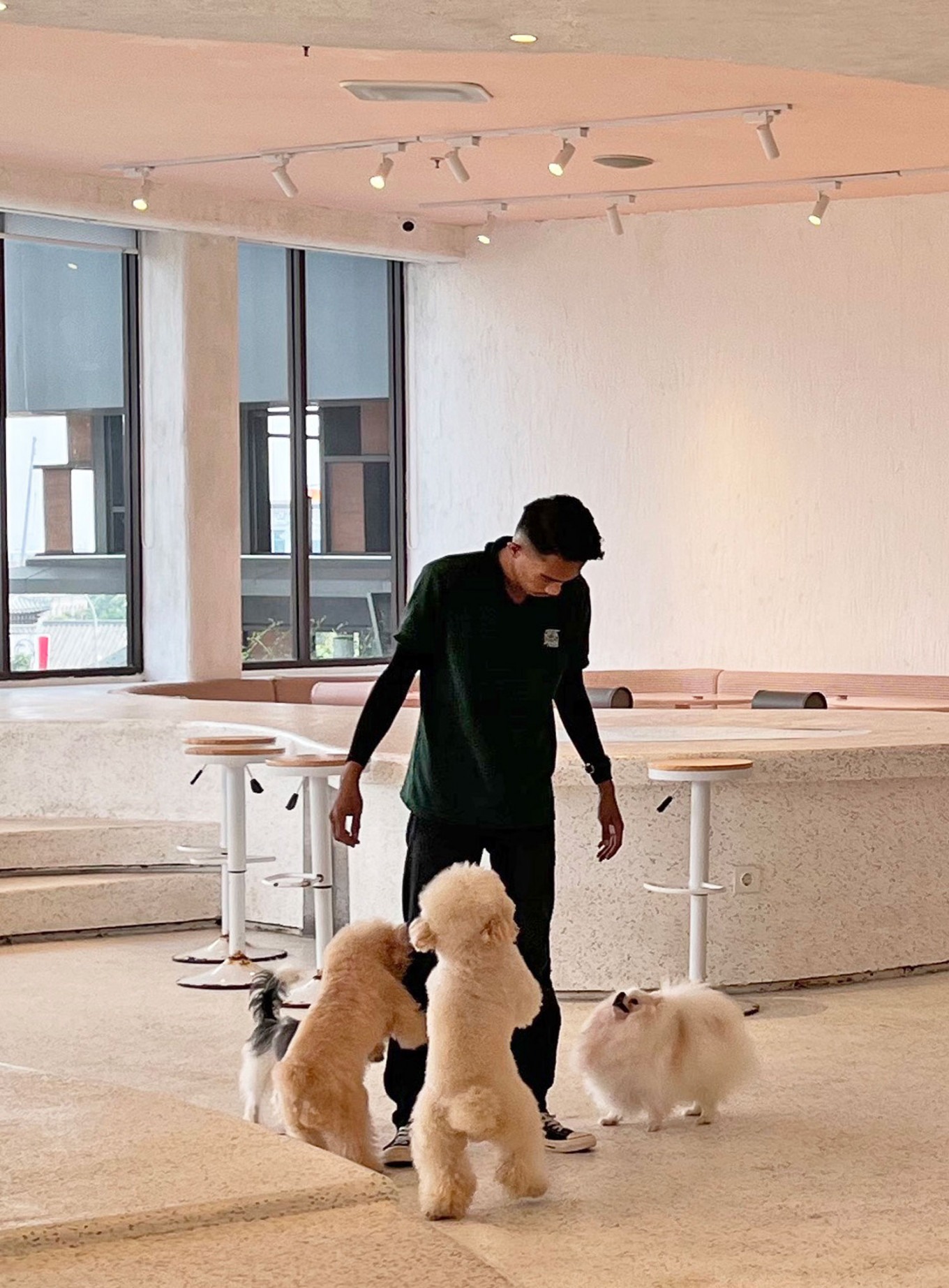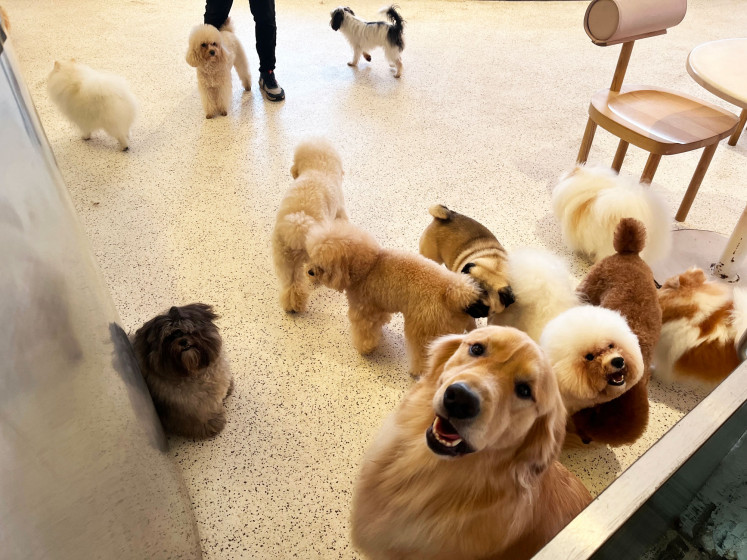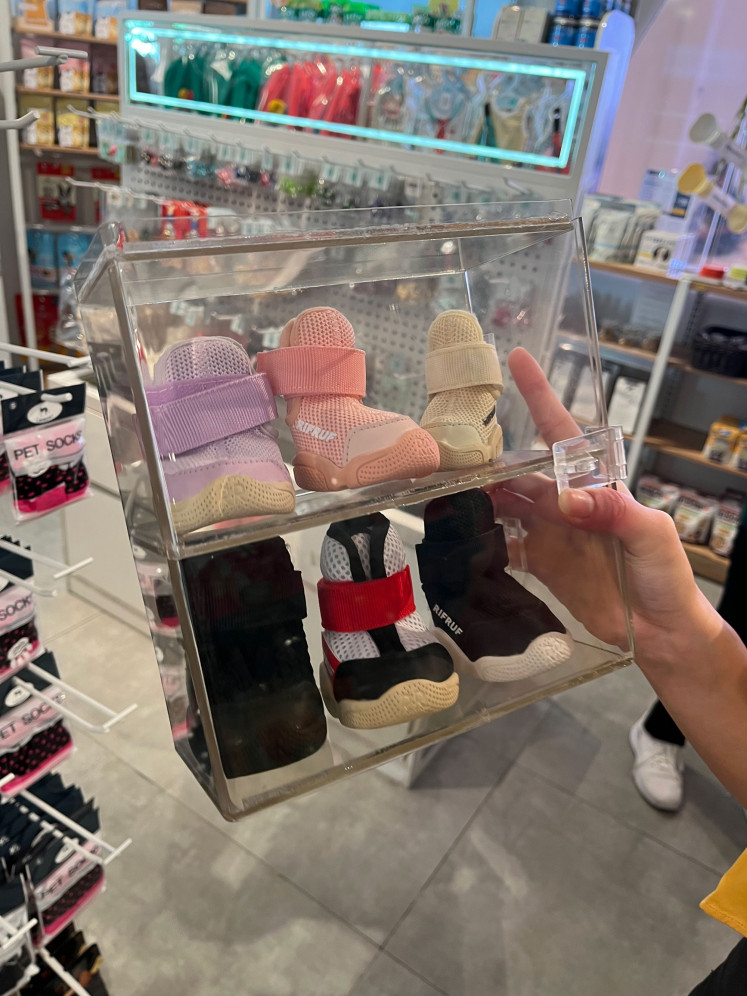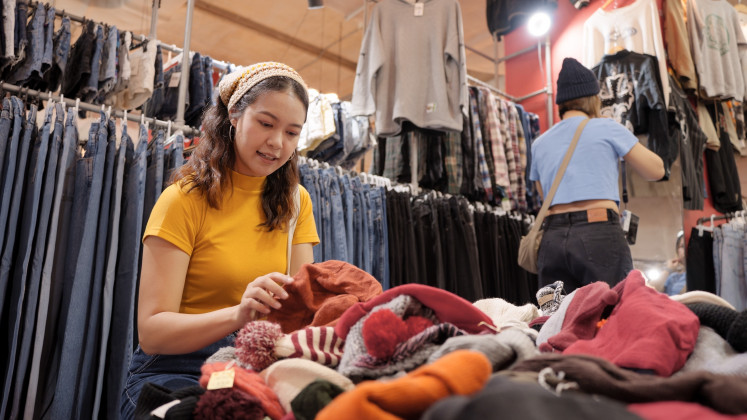Dogs play with the staff at the indoor recreation area of Hyde Park in Pantai Indah Kapuk, North Jakarta. (Courtesy of JP/Felicia Melody)
We all love our pets. Throughout history, animals have been domesticated as human companions. But the emotional attachment we have with these creatures appears to have experienced a shift in the last few years.
Enter “pawrenting”. As suggested, this word that entered the popular lexicon starting in 2020 is short for “paw parent”, meaning to care for a dog or a cat as if they were a human child.
The isolation and for some, the loneliness we experienced during the pandemic prompted many to adopt their first pets.
“Many people got bored and felt the need to find ways to express their empathy,” said Rose Philadonna Karman, marketing director at Hyde Park in North Jakarta’s Pantai Indah Kapuk (PIK), a high-end store and recreation venue for dogs that opened last year.
This piqued my interest. Being a pawrent to an adopted pup, I understood the care it takes for us to love our fur babies.
Our family didn’t adopt as a choice, it was sort of bestowed upon us; so the reality of having animals as an extension of self was quite the surprise.

Thank you!
For signing up to our newsletter.
Please check your email for your newsletter subscription.
But it seems this is increasingly a choice for a growing number of people, including in Indonesia, where those who have anabul, a portmanteau of anak bulu meaning “child with fur”, are being catered to by a growing number of specialty stores and services, even luxury outlets.
(Courtesy of JP/Felicia Melody)
Pawrenting ‘anabul’
According to a Rakuten Insight study in January 2022, 69 percent of Indonesian respondents said they owned pets. Cats were still the most popular at 47 percent, followed by fish at 22 percent, birds at 18 percent, and dogs at 10 percent.
While cat owners still outnumber dog owners at an 8:2 ratio, largely due to religious reasons, this also seems to be changing.
“People often say the stereotype of dog owners is they're non-Muslim,” Donna said.
But, as of recent years, this wasn’t always true: “There are some pawrents here that are Muslim too, and non-Muslim folks who are equally interested in cats!”
The growth in dog pawrents is the reason why a place like Hyde Park can thrive.
Self-described as the “most luxurious rooftop dog park in Jakarta”, it has a turf playground for dogs to run around in and a pool to swim in, as well as a range of services from grooming to styling with professionals from South Korea, and designated cabs to pick your dogs up, even photoshoot sessions!
The compound has a cafe with two sections: One has 40 resident dogs that take shifts playing with customers, another where customers can sit down with their own dogs over brunch.
And Hyde Park is by no means unique. Modern Vet, a comprehensive animal hospital with two branches in Jakarta, offers acupuncture, pilates and even Chinese tui na massage to boost your pet’s well-being. Superdog, a dog park and daycare in Puri, West Jakarta, regularly organizes Sunday picnics and yoga sessions with dogs. Both establishments also opened post-pandemic.
It’s not just in the capital. Grooming Space in Yogyakarta is keeping up with the trend, too.
“Grooming Space was established in 2022 after the pandemic and has been running for two years now,” said owner Deva Satria, sharing his insights into how businesses are responding to the rising demands of pawrents and their anabul.
“In terms of customers, the number has been increasing every day.”
Read also: Five-star staycations for your furry friends
(Courtesy of JP/Felicia Melody)
Changing perception
While not all of these facilities are entirely new, they are moving from niche to mainstream as people’s perception of pawrents change. It is globally, and surprisingly locally, becoming more accepted to spend copious amounts of money on our pets.
Perhaps the pandemic led plenty to realize that celebrating the preciousness of life also means caring more for those dearest to us, including our fur babies.
In response, luxury fashion and beauty houses expanded their product lines to now include pet accessories, going beyond basic needs to the point of sheer frivolity.
Legendary Australian luxury beauty brand Aesop, has a cleanser specifically made for animals, described as ‘a mild skin and fur wash for loyal companions; provides a gentle yet thorough cleanse with deodorizing properties’ going for US$43 a bottle.
At well-loved department stores such as Selfridges and Farfetch, there’s specialized sections for luxury pet accessories. There, you can find designer goods for your pets, or even small niche brands where one branded pack of poop bags costs 17 pounds ($22). Goyard, the classic bag brand, has pet collars going for over $600.
Walk into most local pet supply stores here and you’ll find the array of niche and artisan snacks, holistic frozen raw meals, and even nutrient-rich supplements you might see at a health grocer for humans.
At Bali’s high-end dog hotel and park The Dog Club, specialty paw creams retail for Rp100,000 ($6), while natural soap bars for your precious pups are going for Rp150,000.
At Hyde Park PIK, I was surprised to find socks and sports shoes for pets. The latter come in a set of four, priced at Rp1.2 million, roughly the same as the price of a pair of running shoes for humans.
Another amusing high-end product was a joint supplement priced at Rp850.000.
“I thought people wouldn’t actually buy them but to our surprise, these high price tags don’t matter!” Donna laughed.
“People here are very willing to give all the best things for their anabul.”
While parties are pretty common now to celebrate bark days, or dog birthdays for the uninitiated, a couple of Alaskan Malamutes made the social media rounds last year for their lavish “wedding” ceremony in Jakarta.
Deva said one of Grooming Space’s regular customers asks it to rent a car, buy fuel and hire a driver to pick up all their cats.
“They can cover my revenue for that day, even though they only have four to five cats. And sometimes, they even tip and provide lunch for the groomer,” he said.
Read also: Kick-start your summer: Five events to attend in June
Lifestyle choice
While the trend may have grown during the pandemic, it is still continuing to grow, as more young couples are now opting to have pets with their partners instead of children. Many believe that having pets is easier than having children, especially due to an uncertain future stemming from economic instability and growing concern for the environment.
“I mean, different people choose to have animals for different reasons. Nowadays, those who want to expand their family without having human kids, be it their first or next one, look into having animals,” said Donna.
“Some do it out of care, adopting [from] rescue shelters, and some see it as a way to prepare to have a [child] in the future,” she added.
Many enjoy the company of dogs, especially because of their reciprocally affectionate nature, while others have dogs as motivation for physical activities such as trekking and running.
“Whatever the reason, most people see [animals] as joyous companions,” she said.
Read also: Champagne wishes, caviar dreams: Musings on luxury from the 73rd floor
This article is part of The Weekender, which comes out on the Saturday edition of The Jakarta Post. It offers a variety of lifestyle and culture articles aimed at enriching your reading experience. Subscribe
here to get access to the Saturday edition and all other premium content from the Post.






